【高中英语】《英语语法—虚拟语气》优质课教案
- 格式:pdf
- 大小:155.41 KB
- 文档页数:4
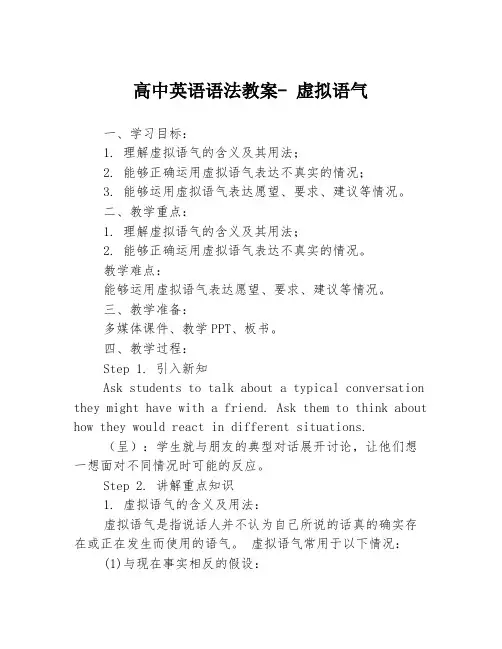
高中英语语法教案- 虚拟语气一、学习目标:1. 理解虚拟语气的含义及其用法;2. 能够正确运用虚拟语气表达不真实的情况;3. 能够运用虚拟语气表达愿望、要求、建议等情况。
二、教学重点:1. 理解虚拟语气的含义及其用法;2. 能够正确运用虚拟语气表达不真实的情况。
教学难点:能够运用虚拟语气表达愿望、要求、建议等情况。
三、教学准备:多媒体课件、教学PPT、板书。
四、教学过程:Step 1. 引入新知Ask students to talk about a typical conversation they might have with a friend. Ask them to think about how they would react in different situations.(呈):学生就与朋友的典型对话展开讨论,让他们想一想面对不同情况时可能的反应。
Step 2. 讲解重点知识1. 虚拟语气的含义及用法:虚拟语气是指说话人并不认为自己所说的话真的确实存在或正在发生而使用的语气。
虚拟语气常用于以下情况:(1)与现在事实相反的假设:If I were you, I would leave this job.(与现在事实相反的假设)If he had arrived earlier, he would have caught the flight.(与过去事实相反的假设)(2)表达愿望、虚构场景、要求、建议等情况:I wish I could speak German fluently.(表达愿望)If I were rich, I would travel around the world.(虚构场景)I suggest that you take a break and relax.(建议)2. 虚拟语气的形式:虚拟条件句:If I had time, I would go shopping.(如果我有时间,我就去购物了。
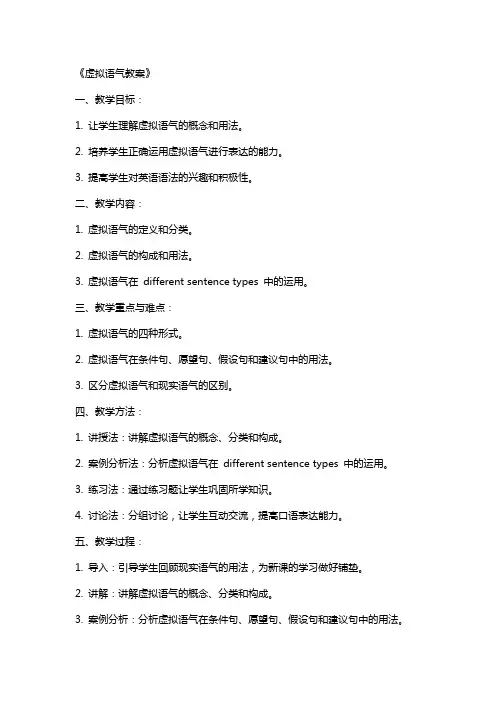
《虚拟语气教案》一、教学目标:1. 让学生理解虚拟语气的概念和用法。
2. 培养学生正确运用虚拟语气进行表达的能力。
3. 提高学生对英语语法的兴趣和积极性。
二、教学内容:1. 虚拟语气的定义和分类。
2. 虚拟语气的构成和用法。
3. 虚拟语气在different sentence types 中的运用。
三、教学重点与难点:1. 虚拟语气的四种形式。
2. 虚拟语气在条件句、愿望句、假设句和建议句中的用法。
3. 区分虚拟语气和现实语气的区别。
四、教学方法:1. 讲授法:讲解虚拟语气的概念、分类和构成。
2. 案例分析法:分析虚拟语气在different sentence types 中的运用。
3. 练习法:通过练习题让学生巩固所学知识。
4. 讨论法:分组讨论,让学生互动交流,提高口语表达能力。
五、教学过程:1. 导入:引导学生回顾现实语气的用法,为新课的学习做好铺垫。
2. 讲解:讲解虚拟语气的概念、分类和构成。
3. 案例分析:分析虚拟语气在条件句、愿望句、假设句和建议句中的用法。
4. 练习:布置练习题,让学生巩固所学知识。
5. 讨论:分组讨论,让学生互动交流,提高口语表达能力。
7. 作业布置:布置课后作业,巩固所学知识。
六、教学评价:1. 课后作业:评估学生对虚拟语气的理解和运用能力。
2. 课堂练习:观察学生在练习中的表现,及时发现问题并进行针对性的辅导。
3. 小组讨论:评价学生在讨论中的参与程度和口语表达能力。
4. 考试:设置有关虚拟语气的试题,检验学生对知识的掌握程度。
七、教学资源:1. 教材:选用合适的英语教材,如《新概念英语》、《大学英语》等。
2. 教案:根据教材内容编写详细的教学计划。
3. 课件:制作课件,辅助讲解和展示虚拟语气的用法。
4. 练习题:编写练习题,巩固学生对虚拟语气的掌握。
八、教学进度安排:1. 第一课时:介绍虚拟语气的概念和分类。
2. 第二课时:讲解虚拟语气的构成和用法。
3. 第三课时:分析虚拟语气在条件句、愿望句、假设句和建议句中的用法。
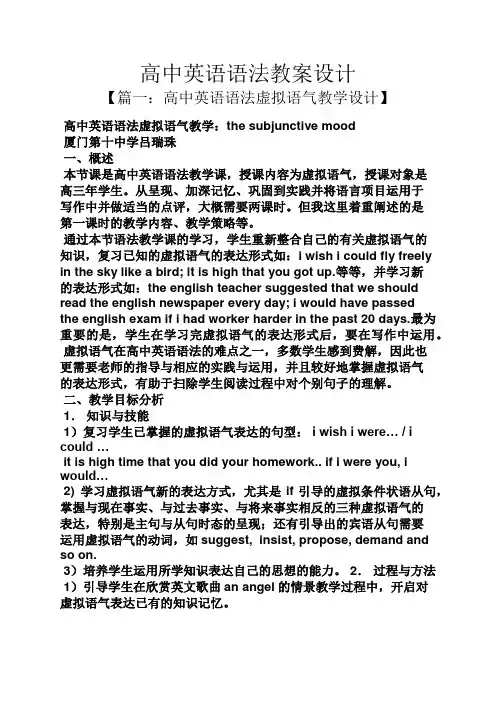
高中英语语法教案设计【篇一:高中英语语法虚拟语气教学设计】高中英语语法虚拟语气教学:the subjunctive mood厦门第十中学吕瑞珠一、概述本节课是高中英语语法教学课,授课内容为虚拟语气,授课对象是高三年学生。
从呈现、加深记忆、巩固到实践并将语言项目运用于写作中并做适当的点评,大概需要两课时。
但我这里着重阐述的是第一课时的教学内容、教学策略等。
通过本节语法教学课的学习,学生重新整合自己的有关虚拟语气的知识,复习已知的虚拟语气的表达形式如:i wish i could fly freelyin the sky like a bird; it is high that you got up.等等,并学习新的表达形式如:the english teacher suggested that we should read the english newspaper every day; i would have passedthe english exam if i had worker harder in the past 20 days.最为重要的是,学生在学习完虚拟语气的表达形式后,要在写作中运用。
虚拟语气在高中英语语法的难点之一,多数学生感到费解,因此也更需要老师的指导与相应的实践与运用,并且较好地掌握虚拟语气的表达形式,有助于扫除学生阅读过程中对个别句子的理解。
二、教学目标分析1.知识与技能1)复习学生已掌握的虚拟语气表达的句型:i wish i were… / i could …it is high time that you did your homework.. if i were you, i would…2) 学习虚拟语气新的表达方式,尤其是if引导的虚拟条件状语从句,掌握与现在事实、与过去事实、与将来事实相反的三种虚拟语气的表达,特别是主句与从句时态的呈现;还有引导出的宾语从句需要运用虚拟语气的动词,如suggest, insist, propose, demand and so on.3)培养学生运用所学知识表达自己的思想的能力。
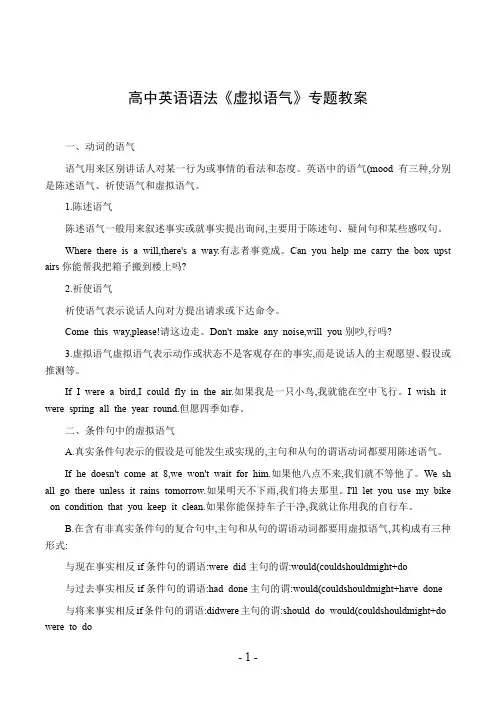
高中英语语法《虚拟语气》专题教案一、动词的语气语气用来区别讲话人对某一行为或事情的看法和态度。
英语中的语气(mood有三种,分别是陈述语气、祈使语气和虚拟语气。
1.陈述语气陈述语气一般用来叙述事实或就事实提出询问,主要用于陈述句、疑问句和某些感叹句。
Where there is a will,there's a way.有志者事竟成。
Can you help me carry the box upst airs你能帮我把箱子搬到楼上吗?2.祈使语气祈使语气表示说话人向对方提出请求或下达命令。
Come this way,please!请这边走。
Don't make any noise,will you别吵,行吗?3.虚拟语气虚拟语气表示动作或状态不是客观存在的事实,而是说话人的主观愿望、假设或推测等。
If I were a bird,I could fly in the air.如果我是一只小鸟,我就能在空中飞行。
I wish it were spring all the year round.但愿四季如春。
二、条件句中的虚拟语气A.真实条件句表示的假设是可能发生或实现的,主句和从句的谓语动词都要用陈述语气。
If he doesn't come at 8,we won't wait for him.如果他八点不来,我们就不等他了。
We sh all go there unless it rains tomorrow.如果明天不下雨,我们将去那里。
I'll let you use my bike on condition that you keep it clean.如果你能保持车子干净,我就让你用我的自行车。
B.在含有非真实条件句的复合句中,主句和从句的谓语动词都要用虚拟语气,其构成有三种形式:与现在事实相反if条件句的谓语:were did主句的谓:would(couldshouldmight+do与过去事实相反if条件句的谓语:had done主句的谓:would(couldshouldmight+have done与将来事实相反if条件句的谓语:didwere主句的谓:should do would(couldshouldmight+do were to do1.表示与现在事实相反的条件条件从句用动词的过去式(be动词用were,主句用should(第一人称或would(全部人称+动词原形。
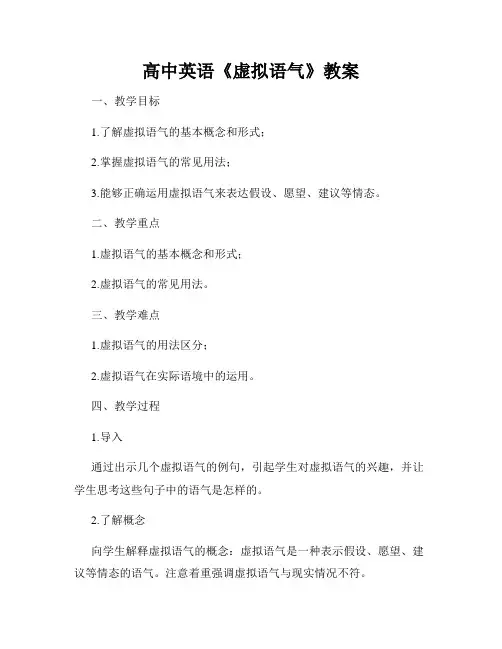
高中英语《虚拟语气》教案一、教学目标1.了解虚拟语气的基本概念和形式;2.掌握虚拟语气的常见用法;3.能够正确运用虚拟语气来表达假设、愿望、建议等情态。
二、教学重点1.虚拟语气的基本概念和形式;2.虚拟语气的常见用法。
三、教学难点1.虚拟语气的用法区分;2.虚拟语气在实际语境中的运用。
四、教学过程1.导入通过出示几个虚拟语气的例句,引起学生对虚拟语气的兴趣,并让学生思考这些句子中的语气是怎样的。
2.了解概念向学生解释虚拟语气的概念:虚拟语气是一种表示假设、愿望、建议等情态的语气。
注意着重强调虚拟语气与现实情况不符。
3.掌握形式3.1 虚拟语气的过去式形式与现在事实相反:主语+动词过去式例如:If I were you, I would go to the party.(要是我是你,我就去参加这个派对。
)3.2 虚拟语气的基本形式与现在事实相反:主语+should/could/might/would+动词原形例如:If I had enough money, I would buy a car.(如果我有足够的钱,我就会买一辆车。
)4.常见用法4.1 表达假设用在if条件句中,表示与现在事实相反的假设情况。
例如:If he were here, he would help us.(如果他在这里,他会帮我们的。
)4.2 表达愿望用在动词后面,表示对未来或现在不可能实现的愿望。
例如:I wish I were a bird.(我希望我是一只鸟。
)4.3 表达建议用在虚拟条件下的建议句中,表示有礼貌的劝告或建议。
例如:You should study hard so that you could pass the exam.(你应该努力学习,这样你才能通过考试。
)5.运用实践让学生在实际交际中运用虚拟语气,例如:假设你是班长,你可以用虚拟语气来向同学提出建议。
6.归纳总结向学生提供一张虚拟语气的总结表格,让学生归纳虚拟语气的基本概念、形式和常见用法,并帮助学生理清思路。
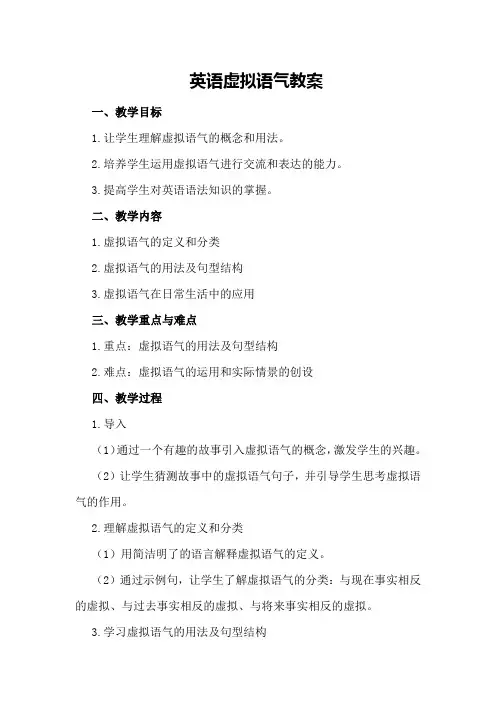
英语虚拟语气教案一、教学目标1.让学生理解虚拟语气的概念和用法。
2.培养学生运用虚拟语气进行交流和表达的能力。
3.提高学生对英语语法知识的掌握。
二、教学内容1.虚拟语气的定义和分类2.虚拟语气的用法及句型结构3.虚拟语气在日常生活中的应用三、教学重点与难点1.重点:虚拟语气的用法及句型结构2.难点:虚拟语气的运用和实际情景的创设四、教学过程1.导入(1)通过一个有趣的故事引入虚拟语气的概念,激发学生的兴趣。
(2)让学生猜测故事中的虚拟语气句子,并引导学生思考虚拟语气的作用。
2.理解虚拟语气的定义和分类(1)用简洁明了的语言解释虚拟语气的定义。
(2)通过示例句,让学生了解虚拟语气的分类:与现在事实相反的虚拟、与过去事实相反的虚拟、与将来事实相反的虚拟。
3.学习虚拟语气的用法及句型结构(1)分别讲解三种虚拟语气的用法和句型结构。
(2)通过练习,让学生掌握虚拟语气的用法。
4.实践虚拟语气的应用(1)设计一些实际情景,让学生运用虚拟语气进行表达。
(2)让学生分组进行角色扮演,运用虚拟语气进行交流。
(2)通过练习,巩固学生对虚拟语气的掌握。
6.作业布置(1)让学生翻译一些含有虚拟语气的句子。
(2)让学生编写一段含有虚拟语气的对话或短文。
五、教学反思1.本节课通过生动的故事导入,激发了学生的学习兴趣。
2.在讲解虚拟语气的用法和句型结构时,注重理论与实践相结合,让学生在实际情景中运用虚拟语气。
3.通过分组练习和角色扮演,提高了学生的互动性和积极性。
4.作业布置有助于巩固学生对虚拟语气的掌握。
5.教学过程中,注意关注学生的反馈,及时调整教学方法和节奏。
六、教学评价1.课后对学生的学习效果进行评价,了解学生对虚拟语气的掌握程度。
2.通过作业和课堂表现,评价学生的参与度和积极性。
3.收集学生的意见和建议,不断改进教学方法,提高教学质量。
七、教学延伸1.进一步讲解虚拟语气的高级用法,如倒装句、强调句等。
2.结合实际生活,让学生学会在不同场景中运用虚拟语气。
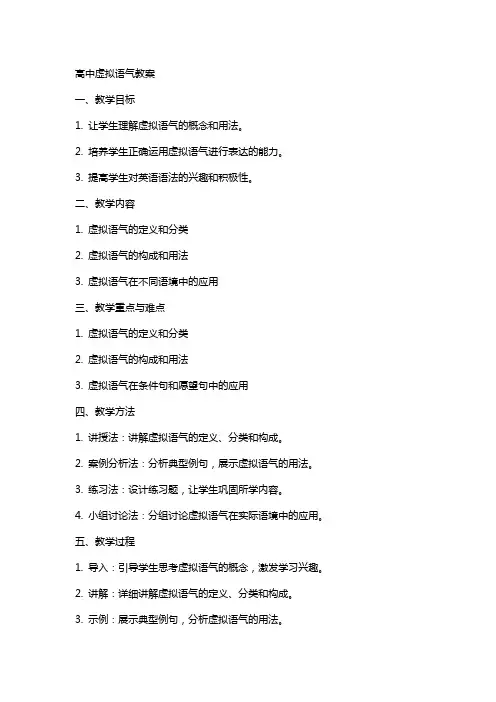
高中虚拟语气教案一、教学目标1. 让学生理解虚拟语气的概念和用法。
2. 培养学生正确运用虚拟语气进行表达的能力。
3. 提高学生对英语语法的兴趣和积极性。
二、教学内容1. 虚拟语气的定义和分类2. 虚拟语气的构成和用法3. 虚拟语气在不同语境中的应用三、教学重点与难点1. 虚拟语气的定义和分类2. 虚拟语气的构成和用法3. 虚拟语气在条件句和愿望句中的应用四、教学方法1. 讲授法:讲解虚拟语气的定义、分类和构成。
2. 案例分析法:分析典型例句,展示虚拟语气的用法。
3. 练习法:设计练习题,让学生巩固所学内容。
4. 小组讨论法:分组讨论虚拟语气在实际语境中的应用。
五、教学过程1. 导入:引导学生思考虚拟语气的概念,激发学习兴趣。
2. 讲解:详细讲解虚拟语气的定义、分类和构成。
3. 示例:展示典型例句,分析虚拟语气的用法。
4. 练习:设计练习题,让学生进行虚拟语气的实际操作。
5. 讨论:分组讨论虚拟语气在条件句和愿望句中的应用。
6. 总结:回顾本节课所学内容,强调虚拟语气的关键点。
7. 作业:布置作业,巩固虚拟语气的运用。
六、教学评估1. 课堂问答:检查学生对虚拟语气概念的理解和运用。
2. 练习题:评估学生对虚拟语气构成和用法的掌握。
3. 小组讨论:观察学生在讨论中的表现,了解他们对虚拟语气的实际应用能力。
七、教学拓展1. 虚拟语气的其他用法:介绍虚拟语气在其他语境中的应用,如虚拟条件句、虚拟倒装句等。
2. 文化背景:讲解虚拟语气在英语文化中的特殊用法和表达习惯。
3. 实践任务:让学生运用虚拟语气编写一段对话或短文,展示其实际应用能力。
八、教学反思1. 总结本节课的教学效果,反思教学方法的适用性。
2. 分析学生的学习情况,针对性地调整教学策略。
3. 搜集学生反馈,了解他们对虚拟语气的掌握程度,为后续教学提供参考。
九、课后作业1. 复习虚拟语气的定义、分类和构成。
2. 完成课后练习题,巩固虚拟语气的运用。
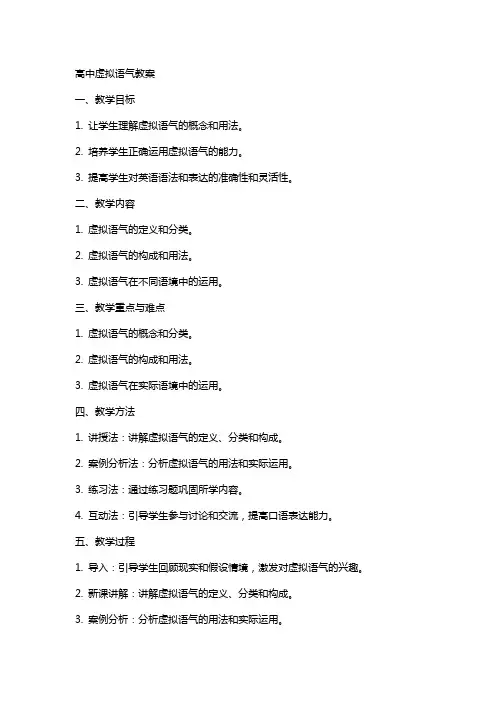
高中虚拟语气教案一、教学目标1. 让学生理解虚拟语气的概念和用法。
2. 培养学生正确运用虚拟语气的能力。
3. 提高学生对英语语法和表达的准确性和灵活性。
二、教学内容1. 虚拟语气的定义和分类。
2. 虚拟语气的构成和用法。
3. 虚拟语气在不同语境中的运用。
三、教学重点与难点1. 虚拟语气的概念和分类。
2. 虚拟语气的构成和用法。
3. 虚拟语气在实际语境中的运用。
四、教学方法1. 讲授法:讲解虚拟语气的定义、分类和构成。
2. 案例分析法:分析虚拟语气的用法和实际运用。
3. 练习法:通过练习题巩固所学内容。
4. 互动法:引导学生参与讨论和交流,提高口语表达能力。
五、教学过程1. 导入:引导学生回顾现实和假设情境,激发对虚拟语气的兴趣。
2. 新课讲解:讲解虚拟语气的定义、分类和构成。
3. 案例分析:分析虚拟语气的用法和实际运用。
4. 练习:布置练习题,让学生巩固所学内容。
5. 互动环节:分组讨论,引导学生运用虚拟语气进行口语表达。
6. 总结与拓展:总结本节课的主要内容,布置课后作业。
7. 课后作业:让学生运用虚拟语气编写句子或小短文。
六、教学评价1. 课后收集学生的练习作品,评估他们对虚拟语气的理解和运用能力。
2. 在下一节课开始时,进行一个小测验,测试学生对虚拟语气的掌握情况。
3. 观察学生在课堂上的参与度和互动情况,了解他们对虚拟语气的兴趣和积极性。
七、教学拓展1. 引导学生思考虚拟语气的文化背景和语用功能,了解不同文化对虚拟语气的使用习惯。
2. 让学生探索虚拟语气在文学、电影等领域的应用,提高他们对语言艺术的欣赏能力。
3. 鼓励学生尝试运用虚拟语气进行创意写作,培养他们的想象力和创造力。
八、教学资源1. 教材:选择适合高中生的英语教材,如《新概念英语》、《牛津英语》等,用于学习和参考。
2. 网络资源:利用互联网查找相关的虚拟语气教学材料、案例和练习题,丰富教学内容。
3. 参考书籍:推荐学生阅读一些英语语法书籍和虚拟语气相关的参考书籍,加深对虚拟语气的理解。
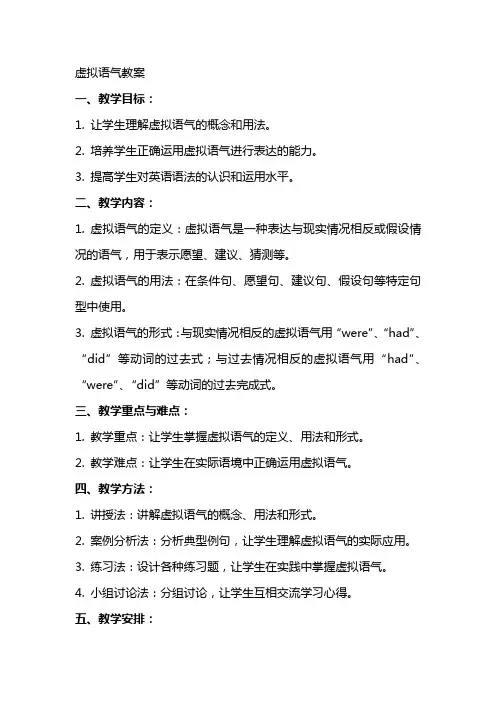
虚拟语气教案一、教学目标:1. 让学生理解虚拟语气的概念和用法。
2. 培养学生正确运用虚拟语气进行表达的能力。
3. 提高学生对英语语法的认识和运用水平。
二、教学内容:1. 虚拟语气的定义:虚拟语气是一种表达与现实情况相反或假设情况的语气,用于表示愿望、建议、猜测等。
2. 虚拟语气的用法:在条件句、愿望句、建议句、假设句等特定句型中使用。
3. 虚拟语气的形式:与现实情况相反的虚拟语气用“were”、“had”、“did”等动词的过去式;与过去情况相反的虚拟语气用“had”、“were”、“did”等动词的过去完成式。
三、教学重点与难点:1. 教学重点:让学生掌握虚拟语气的定义、用法和形式。
2. 教学难点:让学生在实际语境中正确运用虚拟语气。
四、教学方法:1. 讲授法:讲解虚拟语气的概念、用法和形式。
2. 案例分析法:分析典型例句,让学生理解虚拟语气的实际应用。
3. 练习法:设计各种练习题,让学生在实践中掌握虚拟语气。
4. 小组讨论法:分组讨论,让学生互相交流学习心得。
五、教学安排:1. 第一课时:介绍虚拟语气的概念和用法。
2. 第二课时:讲解虚拟语气的形式。
3. 第三课时:分析典型例句,让学生理解虚拟语气的实际应用。
4. 第四课时:设计练习题,让学生在实践中掌握虚拟语气。
5. 第五课时:小组讨论,学生互相交流学习心得。
六、教学评价:1. 课堂参与度:观察学生在课堂上的积极参与程度,以及对虚拟语气知识的理解和运用。
2. 练习完成情况:检查学生完成练习题的情况,评估他们对虚拟语气的掌握程度。
3. 小组讨论:评价学生在小组讨论中的表现,以及对虚拟语气的运用和交流能力。
七、教学准备工作:1. 准备教案、PPT和教学素材。
2. 设计练习题和案例分析题。
3. 准备小组讨论的话题和问题。
八、教学过程:1. 引入新课:通过一个与虚拟语气相关的谜语或故事,引发学生的兴趣。
2. 讲解虚拟语气的概念和用法:使用PPT展示虚拟语气的定义和用法。
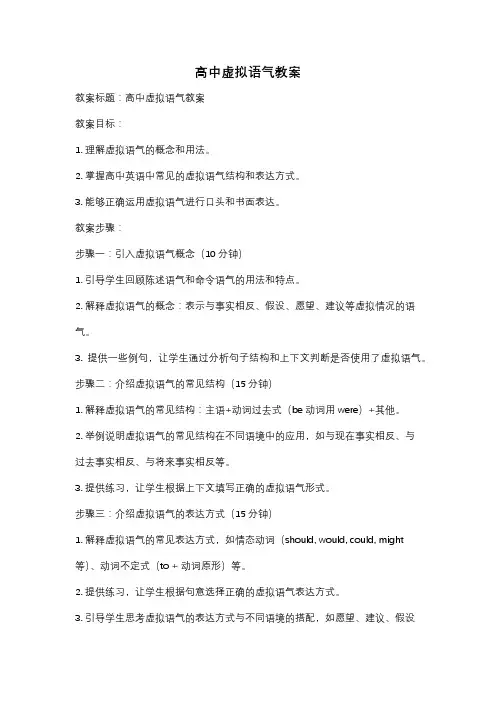
高中虚拟语气教案教案标题:高中虚拟语气教案教案目标:1. 理解虚拟语气的概念和用法。
2. 掌握高中英语中常见的虚拟语气结构和表达方式。
3. 能够正确运用虚拟语气进行口头和书面表达。
教案步骤:步骤一:引入虚拟语气概念(10分钟)1. 引导学生回顾陈述语气和命令语气的用法和特点。
2. 解释虚拟语气的概念:表示与事实相反、假设、愿望、建议等虚拟情况的语气。
3. 提供一些例句,让学生通过分析句子结构和上下文判断是否使用了虚拟语气。
步骤二:介绍虚拟语气的常见结构(15分钟)1. 解释虚拟语气的常见结构:主语+动词过去式(be动词用were)+其他。
2. 举例说明虚拟语气的常见结构在不同语境中的应用,如与现在事实相反、与过去事实相反、与将来事实相反等。
3. 提供练习,让学生根据上下文填写正确的虚拟语气形式。
步骤三:介绍虚拟语气的表达方式(15分钟)1. 解释虚拟语气的常见表达方式,如情态动词(should, would, could, might 等)、动词不定式(to + 动词原形)等。
2. 提供练习,让学生根据句意选择正确的虚拟语气表达方式。
3. 引导学生思考虚拟语气的表达方式与不同语境的搭配,如愿望、建议、假设等。
步骤四:综合运用虚拟语气(20分钟)1. 提供一篇短文或对话,要求学生根据给定的情境和要求使用虚拟语气进行改写或回答问题。
2. 分组讨论和分享学生的答案,引导他们分析不同答案之间的差异和表达方式的合理性。
3. 鼓励学生在讨论中提出更多的虚拟语气应用场景,并进行实践。
步骤五:总结与评价(10分钟)1. 总结虚拟语气的概念、常见结构和表达方式。
2. 提问学生对于虚拟语气的掌握程度和自我评价。
3. 针对学生的问题和困惑进行解答和指导。
教案扩展:1. 提供更多的练习题,让学生巩固和拓展虚拟语气的运用能力。
2. 引导学生分析虚拟语气在文学作品中的运用,如小说、诗歌等。
3. 鼓励学生在写作中尝试使用虚拟语气,提高语言表达的准确性和多样性。
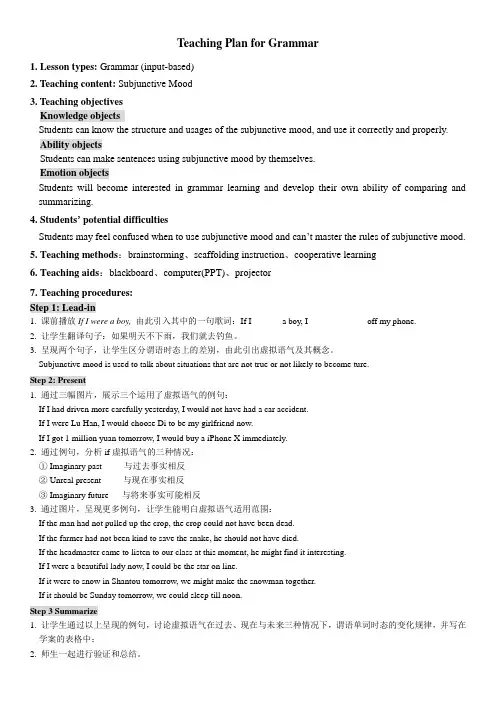
Teaching Plan for Grammar1. Lesson types: Grammar (input-based)2. Teaching content: Subjunctive Mood3. Teaching objectivesKnowledge objectsStudents can know the structure and usages of the subjunctive mood, and use it correctly and properly. Ability objectsStudents can make sentences using subjunctive mood by themselves.Emotion objectsStudents will become interested in grammar learning and develop their own ability of comparing and summarizing.4. Students’ potential difficultiesStudents may feel confused when to use subjunctive mood and can’t master the rules of subjunctive mood.5. Teaching methods:brainstorming、scaffolding instruction、cooperative learning6. Teaching aids:blackboard、computer(PPT)、projector7. Teaching procedures:Step 1: Lead-in1. 课前播放If I were a boy, 由此引入其中的一句歌词:If I ______ a boy, I ______ ______ off my phone.2. 让学生翻译句子:如果明天不下雨,我们就去钓鱼。
高中英语虚拟语气教案模板〔共3篇〕第1篇:英语教案,虚拟语气英语教案范例〔编写:房新霞〕 Unit 1 What would you do?一.教材分析^p本单元选取了学生平日生活中经常出想的一些假设的情况,用一些非常熟悉的场景进展相应的训练。
虚拟语气对学生来说是个全新的语法,掌握好虚拟语气的用法关系到整个第一单元的学习。
所以虚拟语气的掌握对本单元的学习起着重要的作用。
要通过多层面的展示让学生进步听、说、读、写的程度。
二.学情分析^p初四的学生经过四年的学习掌握了一定的根底知识,本单元的内容对他们来说不是很难,而且本单元的内容是一些虚构的东西让他们感到很新颖,并且非常贴近生活,让学生感到亲切、真实,让他们从不同的角度去理解问题,增加学生的情感,让他们把所学到的知识运用到日常生活中。
三.教学目的1.通过本单元的学习会议论一些假设的、虚拟的情况。
2.通过本单元的学习到达如何使用虚拟语气局提出建议的目的。
3.学会表示与如今情况相反的虚拟语气。
4.学会用虚拟语气表述自己还没有实现的愿望。
四.教学重点、难点 1.重点词语:million, pimple, energetic, confident, tie, medical research2.学会运用表示如今与将来情况的虚拟条件句 If+主语+动词的过去式,主语+would+动词原形3.语言构造:If I were you, I would take a shower at first. If I had time, I would certainly go.五.教学准备利用多媒体设备,通过图片展示练习听说读写,培养学生直接用英语理解、表达和思维的才能。
安排适量的练习,让学生当堂消化。
六.教学过程Step 1 Warming up1.Ask some questions about everyday life, such as “How was your vacation?” “What kind of sports do you like?”2.Review the new words we learned yesterday.Step 2 Study the new language1.ask two questions and ask some students to answer a.Do you love money? Do you want to have a lotof money? b.If you had a lot of money, what would you do?I’d … The students may give many different answers.Then let’s listen and do 1b.Listen and number the pictures (1-4) in the order theyhear.And then ask some questions about the material.T: What did the old man do if he had amillion dollars? S: He would…T: What did the first boy do if he had a million dollars? S: He would…T: Why would he second girl put the money in the bank? S: Because she’d …T: Why would the second boy give the money to the medical research?S: Because he’d…Then make conversation according to 1a and 1b.What would you do if you had a million dollars?通过这一对话练习,让学生有节俭节约的习惯,要有爱心,把自己的钱用来帮助那些需要帮助的人,学生乐于助人。
高中英语课教案模板【篇一:高中英语语法课教案】高中英语语法“虚拟语气”的教学设计一、教材分析:本课是结合外研社版高中英语教材选修6中有关虚拟语气的语法内容,进行高三虚拟语气的复习,教学中将语法知识的传授和语言基本技能的学习结合到一起,注重复习语法与语言的运用。
采用任务型教学法和小组合作探究学习法,从而扩大课堂的语言输入量及学生的语言输出量。
二、学情分析:在高一和高二英语学习基础上,高三学生已经掌握基本的语言结构和一定程度的听说读写能力。
在高三语法复习的过程中,结合学生原有的知识掌握水平,巩固基础强化正确使用语法知识,提高学生运用语言的深度和难度.但大部分学生的基础知识仍然较为薄弱,运用英语进行交际活动的能力较差,主动学习的动力不够,然而他们学习比较认真,渴求知欲旺盛,思维比较活跃。
部分学生的基础较好,能主动配合老师。
只有设置使他们感兴趣的活动,因材施教,才能让他们投入到课堂活动中来。
三、教学重点:1.复习的重点---语法虚拟语气的句型结构.2.语法虚拟语气的运用四、教学难点:1.结合复习的语法知识,以课堂教学为依托,全面训练学生的听、说、读、写能力,加强和提高运用英语的综合能力。
2.虚拟语气在真实的生活语境中的使用。
五、教学目标:1.知识目标:引导学生掌握情态动词在虚拟语气之中的使用。
培养学生通读,分析,理解,综合的能力,教会学生体察语境,结合上下文,附和逻辑推理和合理的想象,结合语法和题干中的语境解决高考题。
在运用语言过程中培养学生的观察力、分析力、想象力和自学能力,提高思维能力和运用英语的综合能力。
2.能力目标:利用多媒体手段营造积极和谐教学氛围,使学生进入情景之中,充分调动学生的思维活动和情感体验,规范学生运用英语知识准确表达的能力,同时,发展学生综合语言运用的能力,分析问题和解决问题的能力,培养学生自主学习。
3.德育目标:用情态动词和虚拟语气的句子结构表达思想感情和正确的世界观、人生观。
高中英语语法教案- 虚拟语气虚拟语气是英语中的一种语法形式,指的是表达假设情况、愿望或建议时所使用的语气。
虚拟语气的形式有条件句中的虚拟条件句和主从句中的虚拟语气。
一、条件句中的虚拟条件句条件句中的虚拟条件句使用过去式或过去完成式来表达对现在或未来的假设情况。
虚拟条件句可以分为三类:第一类是与现在事实相反的假设情况;第二类是与过去事实相反的假设情况;第三类是对将来情况的假设。
1.与现在事实相反的假设情况如果条件从句中使用了虚拟语气,那么主句中必须使用would/could/might+动词原形来表达假设情况。
例如:If I were you, I would take the job.如果我是你,我会接受这份工作。
If I had more money, I could travel the world.如果我有更多的钱,我可以周游世界。
如果条件从句使用的是过去完成式,那么主句中就要使用would/could/might + have+动词的过去分词形式来表达假设情况。
例如:If I had studied harder, I would have passed the exam.如果我学习更努力一些,就会通过考试了。
2.与过去事实相反的假设情况与过去事实相反的假设情况指的是对过去情况的假设,这时条件从句要使用过去完成式来表达过去的假设情况,而主句则要使用would/could/might+have +动词的过去分词形式。
例如:If I had known about the party, I would have gone. 如果我当时知道聚会的事情,我就会去了。
3.对将来情况的假设对将来情况的假设,条件从句应该使用一般过去式,而主句则要使用would/could/might+动词原形。
例如:If it rained tomorrow, we would stay inside.如果明天下雨的话,我们就待在室内。
《虚拟语气教案》一、教学目标1. 让学生理解虚拟语气的概念和用法。
2. 培养学生正确运用虚拟语气进行表达的能力。
3. 提高学生对英语语法的认识和运用水平。
二、教学内容1. 虚拟语气的定义和分类2. 虚拟语气的构成和用法3. 虚拟语气在各种从句中的应用4. 虚拟语气在条件句和愿望句中的应用5. 虚拟语气在非真实条件句和虚拟语气句中的应用三、教学重点与难点1. 虚拟语气的概念和分类2. 虚拟语气的构成和用法3. 虚拟语气在各种从句中的应用4. 虚拟语气在条件句和愿望句中的应用5. 虚拟语气在非真实条件句和虚拟语气句中的应用四、教学方法1. 讲授法:讲解虚拟语气的概念、分类、构成和用法。
2. 案例分析法:分析虚拟语气在各种从句中的应用。
3. 练习法:让学生通过练习掌握虚拟语气的运用。
4. 互动法:引导学生进行小组讨论,提高学生的参与度和积极性。
五、教学步骤1. 导入:通过一个谜语引出虚拟语气的概念,激发学生的兴趣。
2. 讲解:讲解虚拟语气的定义、分类、构成和用法。
3. 案例分析:分析虚拟语气在各种从句中的应用。
4. 练习:让学生进行虚拟语气的练习,巩固所学知识。
5. 互动讨论:分组讨论虚拟语气在条件句和愿望句中的应用。
6. 总结:对本节课的内容进行总结,强调虚拟语气的重要性和运用。
7. 作业布置:布置相关练习题,让学生课后巩固虚拟语气的运用。
六、教学拓展1. 介绍虚拟语气的其他用法,如虚拟语气在评论、建议、命令等句子中的应用。
2. 讲解虚拟语气与现实世界的联系,让学生了解虚拟语气在表达非现实情况时的作用。
3. 通过实例展示虚拟语气在文学作品、电影、广告等中的运用,提高学生对虚拟语气的认识。
七、课堂练习1. 编写一些关于虚拟语气的练习题,包括选择题、填空题和改错题,让学生进行练习。
2. 设计一个虚拟语气的小场景,让学生进行角色扮演,运用虚拟语气进行交流。
八、作业设计1. 布置一些有关虚拟语气的练习题,让学生课后巩固所学知识。
高一英语虚拟语气教案优选篇高一英语虚拟语气教案 1教学重点:1.辨别应用虚拟语气的各种句型;2.确定含虚拟语气的各种句型中主、从句谓语动词形式。
教学难点:1.如何辨认错综型虚拟语气;2.如何在语篇中应用虚拟语气。
教学过程:Ⅰ.复习从课文中找出含有虚拟语气的句子,关注其谓语动词形式,初步了解虚拟语气。
Ⅱ.讲解分析1.在含有if引导的虚拟条件句的主从复合句中,主、从句谓语动词形式表示与客观事实相反的假设,分为过去、现在和将来的情况。
需要牢记下面的结构,因为只有在此基础上才可以辐射其他变化形式。
时间If条件从句中的谓语动词形式主句结构过去had+过去分词would/should/could/might+have+过去分词现在过去式(be的形式常用were)would/should/could/might+动词原形将来a. 过去式(常有将来时间或上下文提示)b. should+动词原形c. were to+动词原形would/should/could/might+动词原形重点在于辨认清楚主句和从句,并准确对应主、从句谓语动词形式,难点是在没有时间状语的前提下,如何根据从句谓语动词形式确定主句谓语动词形式或根据主句谓语动词形式确定从句谓语动词形式。
2.虚拟条件句中if的省略与句子的倒装If 引导的虚拟条件句的谓语部分如有助动词had, were, should时,可以把if省略,这时需将助动词had, were 或should 提到主语的前面,构成部分倒装语序。
3.含有错综时间条件句的主从复合句有时候,虚拟性条件句中谓语动词的动作和主句中谓语动词的动作发生的时间不一致,称为错综时间条件句,重点在于注意主、从句各自动作所发生的时间是否一致,难点在于结合语境中的主、从句各自动作所发生的时间来确定各自所应该用的时态。
4.与表示“建议、要求、请求、命令、坚持”等意思的词有关的虚拟语气a. 动词后接的宾语从句b. It+ be+动词的过去分词+that。
教案虚拟语气教案标题:教案虚拟语气教案目标:1. 了解虚拟语气的概念和用法。
2. 能够正确运用虚拟语气表达假设、愿望、建议等意义。
3. 培养学生对虚拟语气的敏感性,提高语言表达的准确性和流利度。
教案步骤:步骤一:引入虚拟语气(10分钟)1. 向学生介绍虚拟语气的概念,解释虚拟语气在语法上的作用。
2. 给学生提供几个虚拟语气的例子,并让他们猜测这些句子的意义和用法。
步骤二:虚拟语气的用法(15分钟)1. 解释虚拟语气的三种主要用法:假设、愿望和建议,并提供相应的例子。
2. 通过练习,让学生分辨句子中的虚拟语气,并解释其意义。
3. 给学生展示一些常见的虚拟语气表达方式,如:If I were you, I would..., I wishI could..., It's time...等。
步骤三:练习运用虚拟语气(20分钟)1. 提供一些情景,让学生运用虚拟语气来表达假设、愿望和建议。
2. 分组讨论,让学生在小组内创造一些情景,然后用虚拟语气来表达。
3. 老师给予学生反馈和指导,纠正他们在运用虚拟语气时可能出现的错误。
步骤四:巩固与评估(15分钟)1. 提供一些虚拟语气的练习题,让学生独立完成。
2. 教师检查学生的答案,并给予评估和反馈。
3. 结束前,教师总结本节课的重点和难点,并鼓励学生在日常生活中多运用虚拟语气。
教学资源:1. 虚拟语气的例句和练习题。
2. 课堂练习活动的情景设定。
3. 学生练习册或笔记本。
教学延伸:1. 鼓励学生在写作和口语表达中多使用虚拟语气,以提高语言表达的准确性和流利度。
2. 提供更多的练习资源,让学生在课后继续巩固和运用所学的虚拟语气知识。
3. 引导学生阅读虚拟语气相关的文章或故事,以扩展他们对虚拟语气的理解和运用能力。
教案评估:1. 学生在课堂练习中的参与度和表现。
2. 学生在练习题中的正确率和语言表达的准确性。
3. 学生对虚拟语气概念和用法的理解程度,以及在日常生活中的运用情况。
Grammar-------Subjective mood Teaching Aims1.Knowledge AimHelp the students to use the subjunctive mood correctly in different situations.2.Ability AimTo learn the subjunctive mood freely and properly in speaking and writing.3.Emotional Aims1)Encourage the students learn more about the grammar.1)Help the students to form the good habit in learning.1)Encourage the students to do more exercise consolidate theknowledge.Teaching Important PointEnable the students to use the correct form o f of the subjunctive moodTeaching Difficult PointTo know the differences between the attributive and the predicative.Teaching Methods:Summarizing,comparative method;practicing activities Teaching AidsMulti-media classroom and other normal teaching tools Teaching ProcedureStepⅠGreetingGreet the whole class.StepⅡDictationStepⅢHomework checkingStepⅣGrammar虚拟语气(Subjunctive Mood)这一语法项目是各类英语考试中心测试的重点之一。
虚拟语气是一种特殊的动词形式,用来表示说话人所说的话并不是事实,而是一种假设、愿望、怀疑或推测。
判断是真实条件句还是非真实条件句。
只有在非真实条件句中才使用虚拟语气。
通过句子意思,看假设的条件是否能够实现,能够实现是真实条件句,不能使用虚拟语气;假设的条件不能实现则是非真实条件句,要用虚拟语气.判断这个假设是与哪个事实相反。
通常有三种情况:①与过去事实相反。
②与现在事实相反。
③与将来事实可能相反I:虚拟条件句:1.虚拟现在时表示与现在事实相反的假设,其if从句的谓语形式用动词的过去式(be一般用were),主句用would/should/could/ might+动词原形。
If places were a like,there would be little need for geographers.如果各个地方都一样,就不需要地理学家了。
2.虚拟过去时是表示与过去事实相反的假设,if从句的谓语形式用过去完成时即had+过去分词,主句用would/should/could/ might+have+过去分词。
If he had known your address yesterday,he would have telephoned you.3.虚拟将来时是表示对将来实现的可能性很小的或不确定的假设。
If从句的谓语形式用一般过去式或用were to/should+动词原形,主句用would/should/could/might+动词原形。
If he were to leave today,he would get there by Friday4.省略if采用倒装语序的条件句。
有时可以把含有助动词、情态动词、be或have的虚拟条件句中的连词if省去,而将had,should, were等词提到主语之前,即用倒装结构。
Had he worked harder,he would have got through the exams. Were he to leave today,he would get there by Friday.Were I in your place,I wouldn’t do that.5混合虚拟语气有时主句和从句的谓语动词指不同的时间,这时需要用混合虚拟语气。
一般来说,在这种情况下,主从句谓语动词指代的时间不同,所以我们又可以错综时间条件句,在这种虚拟情况,动词形式应根据实际情况灵活使用,在做这些题目时候尤其要注意每道题目的提示语:时间状语。
绝大多数情况下,从句或者主句都有相关的时间状语,这是我解题的关键。
If you_____that late movie last night,you wouldn’t be so sleepy.A.haven’t watchedB.didn’t watchC.hadn’t watchedD.wouldn’t have watched答案选C。
Had Paul received six more votes in the last election,he would be our chairman now.混合虚拟语气还有一种情况就是事实和虚拟假设的混合句,这样的句子不仅仅是时间的不同,而重要是事实和假设的混合。
I would have gone to visit him in the hospital had it been at all possible,but I was fully occupied the whole of last week.该句前半部分是假设虚拟,而后半部分是事实的陈述。
Your math instructor would have been happy to give you a make-up examination had you gone and explained that your parents were ill at the time.该句前半句用的是假设虚拟,后半句主句也用的是假设虚拟(如果你去并且解释的话),但是后半句的从句用的是事实语气,因为“父母病了”是客观事实,故不需要用虚拟形式had been。
6.含蓄虚拟条件句含蓄条件句是指句中没有明显的虚拟条件句,而是利用其他手段来暗示存在虚拟条件。
但是这类隐含式虚拟条件句往往都可以转化为if引导的条件句。
常来表示含蓄虚拟条件的手段有:(1)介词或介词短语,如but for,but that,without,in case of,under more favorable condition等。
Without the leadership of the party,we could not be living a happy today.=If there hadn’t been the leadership of the party,we could not be living a happy today.A.In spite ofB.But forC.Because ofD.As for答案选B。
(2)连词,如:so that,unless,in case,supposing,lest,provided(倘若……),for fear that(唯恐),in order that,on condition that,if only(要是……就好了)等。
She listened carefully in order that she might discover exactly what he wanted.=if she listened carefully,she might discover exactly what he wanted.If only I had more money,I could buy a car.(注:lest,for fear that和in case引起的从句中谓语动词多用should+动词原形,但可以不用虚拟语气,而用动词的陈述语气形式。
)例如:The foreign teacher spoke slowly in case we misunderstood him.这位外籍教师说得很慢以免我们听不懂。
Care must be taken in using this method lest overflow should occur.在使用此法时要小心谨慎,以免会发生溢流现象。
II:wish后的that从句中:1.表示现在或将来的愿望,从句中过去式.I wish I knew his address.I wish I were young.2.表示过去没有实现或不可能实现的愿望,从句用过去完成式或would,could,might+have+过去分词.I wish you had written to him.I wish I could have slept longer this morning,but I had to get up and come to class.3.如果将wish改成wished,其后that从句中的动词形式不变.4.如果that从句中用would,一般表示对现状不满或希望未来有所改变或请求I wish he would answer my letter.I wish prices would come down.I wish you would help me.I wish you would stop asking silly questions.StepⅤExercisesEx.1----4in using structures on page43.Then check the answers. Prepare for the Listening and Talking on page41.StepⅥHomeworkPrepare for the Listening and Talking on page41 Afterthoughts。